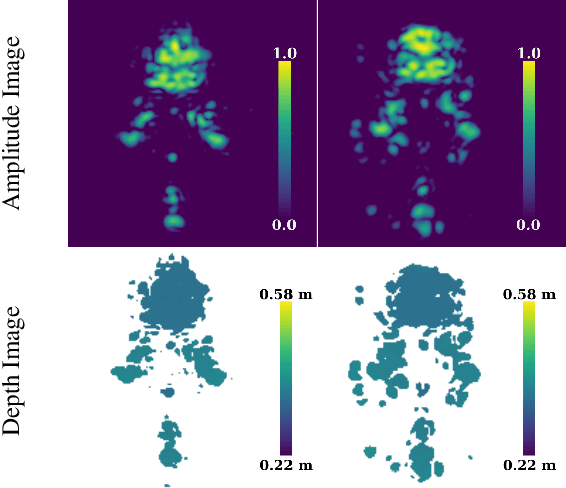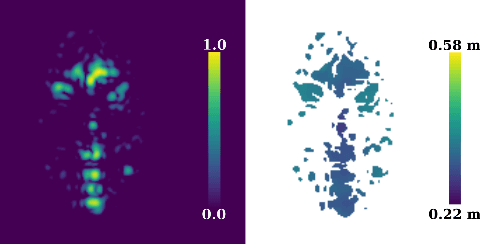Matthias Berking
3D Face Reconstruction From Radar Images
Dec 03, 2024



Abstract:The 3D reconstruction of faces gains wide attention in computer vision and is used in many fields of application, for example, animation, virtual reality, and even forensics. This work is motivated by monitoring patients in sleep laboratories. Due to their unique characteristics, sensors from the radar domain have advantages compared to optical sensors, namely penetration of electrically non-conductive materials and independence of light. These advantages of radar signals unlock new applications and require adaptation of 3D reconstruction frameworks. We propose a novel model-based method for 3D reconstruction from radar images. We generate a dataset of synthetic radar images with a physics-based but non-differentiable radar renderer. This dataset is used to train a CNN-based encoder to estimate the parameters of a 3D morphable face model. Whilst the encoder alone already leads to strong reconstructions of synthetic data, we extend our reconstruction in an Analysis-by-Synthesis fashion to a model-based autoencoder. This is enabled by learning the rendering process in the decoder, which acts as an object-specific differentiable radar renderer. Subsequently, the combination of both network parts is trained to minimize both, the loss of the parameters and the loss of the resulting reconstructed radar image. This leads to the additional benefit, that at test time the parameters can be further optimized by finetuning the autoencoder unsupervised on the image loss. We evaluated our framework on generated synthetic face images as well as on real radar images with 3D ground truth of four individuals.
Predicting Individualized Effects of Internet-Based Treatment for Genito-Pelvic Pain/Penetration Disorder: Development and Internal Validation of a Multivariable Decision Tree Model
Mar 15, 2023



Abstract:Genito-Pelvic Pain/Penetration-Disorder (GPPPD) is a common disorder but rarely treated in routine care. Previous research documents that GPPPD symptoms can be treated effectively using internet-based psychological interventions. However, non-response remains common for all state-of-the-art treatments and it is unclear which patient groups are expected to benefit most from an internet-based intervention. Multivariable prediction models are increasingly used to identify predictors of heterogeneous treatment effects, and to allocate treatments with the greatest expected benefits. In this study, we developed and internally validated a multivariable decision tree model that predicts effects of an internet-based treatment on a multidimensional composite score of GPPPD symptoms. Data of a randomized controlled trial comparing the internet-based intervention to a waitlist control group (N =200) was used to develop a decision tree model using model-based recursive partitioning. Model performance was assessed by examining the apparent and bootstrap bias-corrected performance. The final pruned decision tree consisted of one splitting variable, joint dyadic coping, based on which two response clusters emerged. No effect was found for patients with low dyadic coping ($n$=33; $d$=0.12; 95% CI: -0.57-0.80), while large effects ($d$=1.00; 95%CI: 0.68-1.32; $n$=167) are predicted for those with high dyadic coping at baseline. The bootstrap-bias-corrected performance of the model was $R^2$=27.74% (RMSE=13.22).
 Add to Chrome
Add to Chrome Add to Firefox
Add to Firefox Add to Edge
Add to Edge